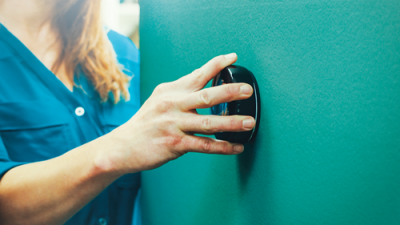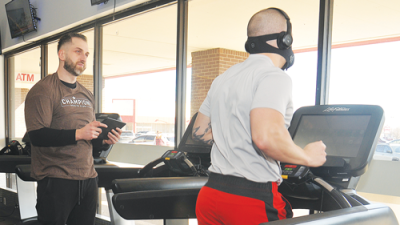
“Sleep is a necessity, not a luxury,” Dr. Nader Mina, medical director, Sleep Center, Corewell Health, said. “Chronic sleep disorders cause problems long term. It has consequences on the heart, increases risks of asthma and is strongly linked to iron deficiency.”
METRO DETROIT — Most of us have been there.
Snuggled in bed under a favorite blanket, yet unable to fall asleep.
When counting sheep doesn’t work, we lie awake all night long. Then it’s morning. Exhaustion sets in, and you wonder how you’ll make it through the day.
For some people, a sleepless night happens on occasion. However, for others, chronic insomnia, sleep apnea and other disorders make it impossible to ever have sweet dreams.
Brenna Wyffels, a family medicine physician assistant, certified, for McLaren Macomb — Sterling Heights Pediatrics & Family Medicine, has helped many patients with sleep disorders.
“Sleep is the first priority,” Wyffels said. “If not, everything else is going to suffer.”
Sleep apnea, which causes snoring and people to sometimes wake in the middle of the night gasping for air, is the main culprit for wakefulness.
“When you have pauses in breathing and impaired breathing, the brain isn’t getting enough oxygen,” Wyffels said. “People wake up with fatigue even after eight hours of sleep.”
For patients having sleeping issues, Wyffels recommends they make an appointment with a sleep clinic “to be tested and monitored and to see what treatment would be the best.” Sleep studies also can be done at home. CPAP (continuous positive airway pressure) machines are often recommended for sleep apnea. The machine contains a motor and a filter that turns room air into pressurized air and delivers it through a mask to help the nose and mouth keep the airway open.
“They get a bad rap as loud machines with giant hoses that (will) keep (your) partner awake,” Wyffels said, adding that the machines are now easier to handle. “Technology has come very far.”
Wyffels has witnessed patients with CPAP machines overcome their sleep issues.
“They have better mental clarity, can focus and feel rested,” she said.
Along with sleep disorders, people are always on the go and don’t give themselves a chance to wind down to transition from the stress of the day.
“Unplug at the end of the day,” Wyffels said. “Have some sort of routine. Settle into bed with a book or podcast. Sleepytime tea, magnesium supplements and calming diffusers can get them ready for bed. People also tend to sleep better if it’s cool out.”
Therefore, turning down the thermostat could help. White noise, blackout curtains and weighted blankets in the bedroom can be used as sleep aids, too. The right pillow and mattress that support you also might make a difference between tossing and turning all night or sleeping soundly.
“Some pillows and mattresses are better for side sleepers, back sleepers or stomach sleepers,” Wyffels said.
Scandia Home, located in Birmingham, carries a large selection of fine linens, comforters, pillows, duvet sets and mattress pads that provide a cozy environment for a good night’s sleep.
“We specialize in European bedding from various European linen companies,” Danielle Schindler said of the family-owned business. “I help people solve their bedroom quandaries and do it in a way that makes the home beautiful.”
Staff at Scandia Home, which also sells specialty gifts, is always available to help customers looking for bedding that is not only stylish, but comfortable.
“We help you figure out your stature, what sleep position you prefer and if you want a firmer mattress to keep the spine straight,” Schindler said. “Comforters and pillows are really important to get a good night’s sleep. Get the right pillow that provides support. Nice linens will last a very long time, up to 25 years.”
Clients also may opt for a mattress with temperature control that can automatically adjust how cold or hot it feels.
“That’s very important for sleeping,” Schindler said. “It keeps you at a comfortable heat.”
Fibers also should be taken into consideration. Cotton percale bedsheets, for instance, are cool to the touch due to the lightweight, breathable weave that provides good airflow. Cotton sateen material is warmer.
‘Sleep is a necessity, not a luxury’
The Centers for Disease Control and Prevention recommends that adults ages 18-60 get at least seven hours of sleep per night; adults 61–64 get seven to nine hours of sleep; adults 65 and older get seven to eight hours of sleep. The American Academy of Pediatrics recommends more sleep for children from infancy to age 18 depending on the age. Yet many people aren’t getting enough shut-eye.
According to Dr. Nader Mina, medical director, Sleep Center, Corewell Health, sleep deprivation can increase the risks of cardiovascular diseases, strokes and diabetes. Lack of sleep affects mental health, job performance, academics and can lower your immune system. Sleep deficiency also can contribute to car crashes because of driver fatigue.
“Sleep is a necessity, not a luxury. Sleep apnea is the most common sleep disorder. When your breathing is closed and narrowed, there’s a drop in the oxygen level,” Mina said. “Chronic sleep disorders cause problems long term. It has consequences on the heart, increases risks of asthma and is strongly linked to iron deficiency.”
One reason for sleeplessness could be what Mina described as “bad routine habits we do every night.” That includes being on cellphones and other electronic devices, or watching television just before bed.
Exposure to blue light in those devices disrupts sleep patterns because it impacts when bodies create melatonin. Mina recommends shutting down electronic devices 30 to 60 minutes before bedtime. Also, if something is bothering you that could be keeping you up, journaling before bedtime could solve that issue.
“Once you engage your mind, it becomes very difficult for our brains to shut down and go to sleep,” Mina said. “It’s very essential to relax before going to bed. Our brains are not able to fall asleep very quickly.”
He also advised to stop drinking coffee and other caffeinated beverages six hours before bedtime. Another tip: make sure the bedroom is quiet, dark and cool. Taking certain medicines at nighttime also could be the reason for sleeplessness. Mina encourages people to speak to their physicians about possibly taking their medications during the daytime rather than in the evening.
“This is very important to discuss with a health care provider,” Mina said.
Daylight saving time also can be an issue for some, and might take two to three weeks before the body adjusts. Mina also treats patients who sleep excessively, including those with narcolepsy.
“There are certain disorders we look for in the brain,” Mina said.
Mina and staff devise an individualized plan for each patient with pretesting and analysis to get them on a better sleep pattern.
“It’s a gradual process,” he said. “It’s going to take some time, but there is always hope.”
 Publication select ▼
Publication select ▼






















